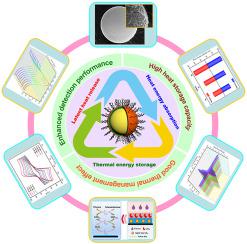Biosensors and Bioelectronics ( IF 10.7 ) Pub Date : 2021-08-24 , DOI: 10.1016/j.bios.2021.113586 Zhao Sun 1 , Huan Liu 1 , Xiaodong Wang 1

|
Enzyme-based biosensors are sensitive to temperature due to their strong temperature dependency of catalytic activity. Aiming at enhancing biosensing detection for glucose assay over a wide range of applicable temperatures, we designed a thermal self-regulatory intelligent biosensor through an innovative integration of phase change material (PCM) and bioelectrocatalytic substances. An electroactive phase-change microcapsule system was firstly fabricated by microencapsulating n-docosane as a PCM core in the SiO2 shell, followed by depositing polydopamine along with carbon nanotubes as an electroactive layer on the surface of SiO2 shell. The resultant microcapsules showed a regularly spherical morphology and well-defined core-shell microstructure. They also exhibited a satisfactory latent heat capacity of around 137 J/g for implementing temperature regulation with a good working stability. An electrochemical biosensing system was constructed with the resultant electroactive microcapsules together with glucose oxidase as a redox enzyme, achieving a thermal self-regulation capability to enhance the biosensing detection of glucose under in-situ thermal management at higher temperatures. With a high sensitivity of 5.95 μA⋅mM−1⋅cm−2 and a lower detection limit of 13.11 μM at 60 °C, the intelligent biosensor developed by this study demonstrated a superior determination capability and better detection performance toward glucose than conventional biosensors in a high temperature region thanks to effective regulation of microenvironment temperature in the electrode system. This study provides a promising strategy for the development of thermal self-regulatory smart biosensors with an enhanced identification ability to detect various chemical substances over a wide range of applicable temperatures.
中文翻译:

基于碳纳米管修饰相变微胶囊的热自调控智能生物传感器增强葡萄糖检测
基于酶的生物传感器对温度敏感,因为它们对催化活性有很强的温度依赖性。为了在广泛的适用温度范围内增强葡萄糖测定的生物传感检测,我们通过相变材料(PCM)和生物电催化物质的创新集成设计了一种热自调节智能生物传感器。的电相变微胶囊系统首先通过微胶囊化而制作Ñ作为一氧化硅PCM芯-docosane 2壳,接着作为电层SiO的表面上有碳纳米管沿沉积聚多巴胺2贝壳。所得微胶囊显示出规则的球形形态和明确定义的核壳微观结构。它们还表现出令人满意的潜热容量,约为 137 J/g,用于实现具有良好工作稳定性的温度调节。将所得电活性微胶囊与作为氧化还原酶的葡萄糖氧化酶一起构建了电化学生物传感系统,实现了热自调节能力,以增强在较高温度下原位热管理下葡萄糖的生物传感检测。具有 5.95 μA⋅mM -1 ⋅cm -2的高灵敏度本研究开发的智能生物传感器在 60°C 下的检测下限为 13.11 μM,由于有效调节电极系统中的微环境温度,因此在高温区域表现出比传统生物传感器更优越的测定能力和更好的葡萄糖检测性能. 该研究为开发具有增强识别能力的热自调节智能生物传感器提供了一种有前景的策略,可在广泛的适用温度范围内检测各种化学物质。











































 京公网安备 11010802027423号
京公网安备 11010802027423号